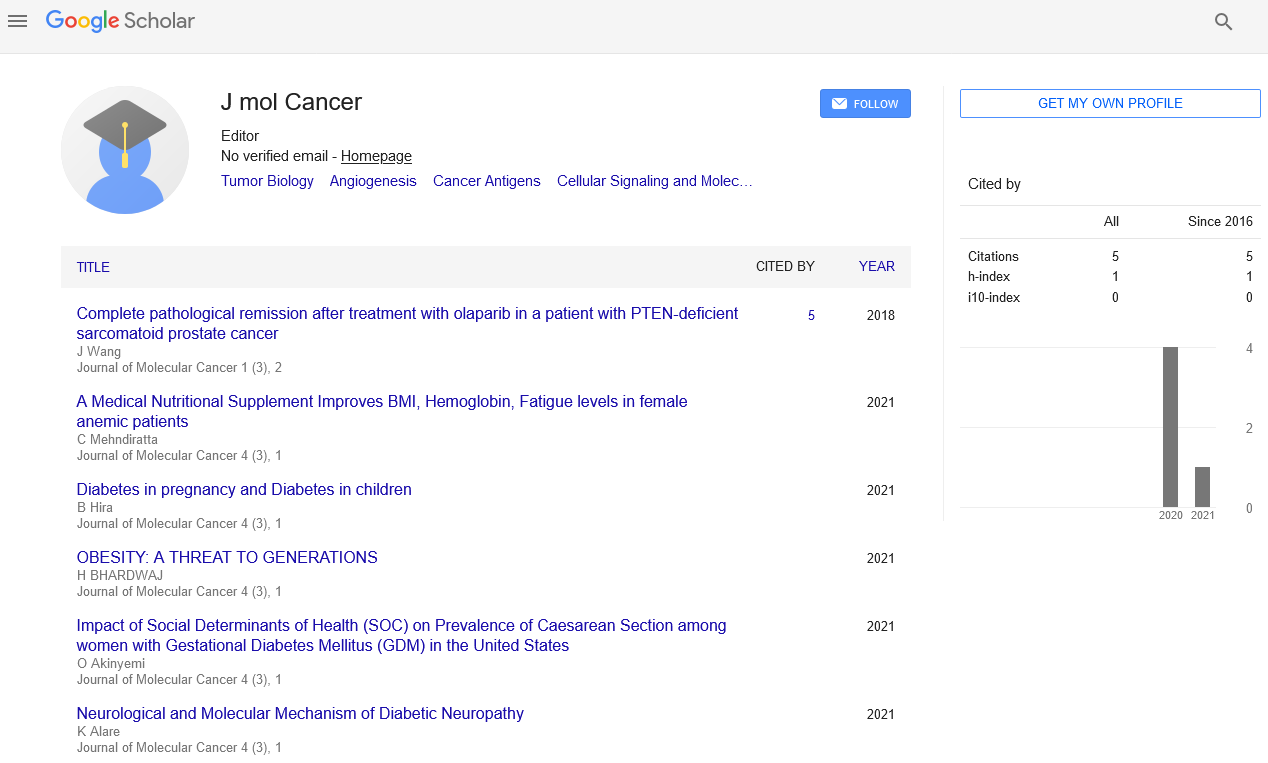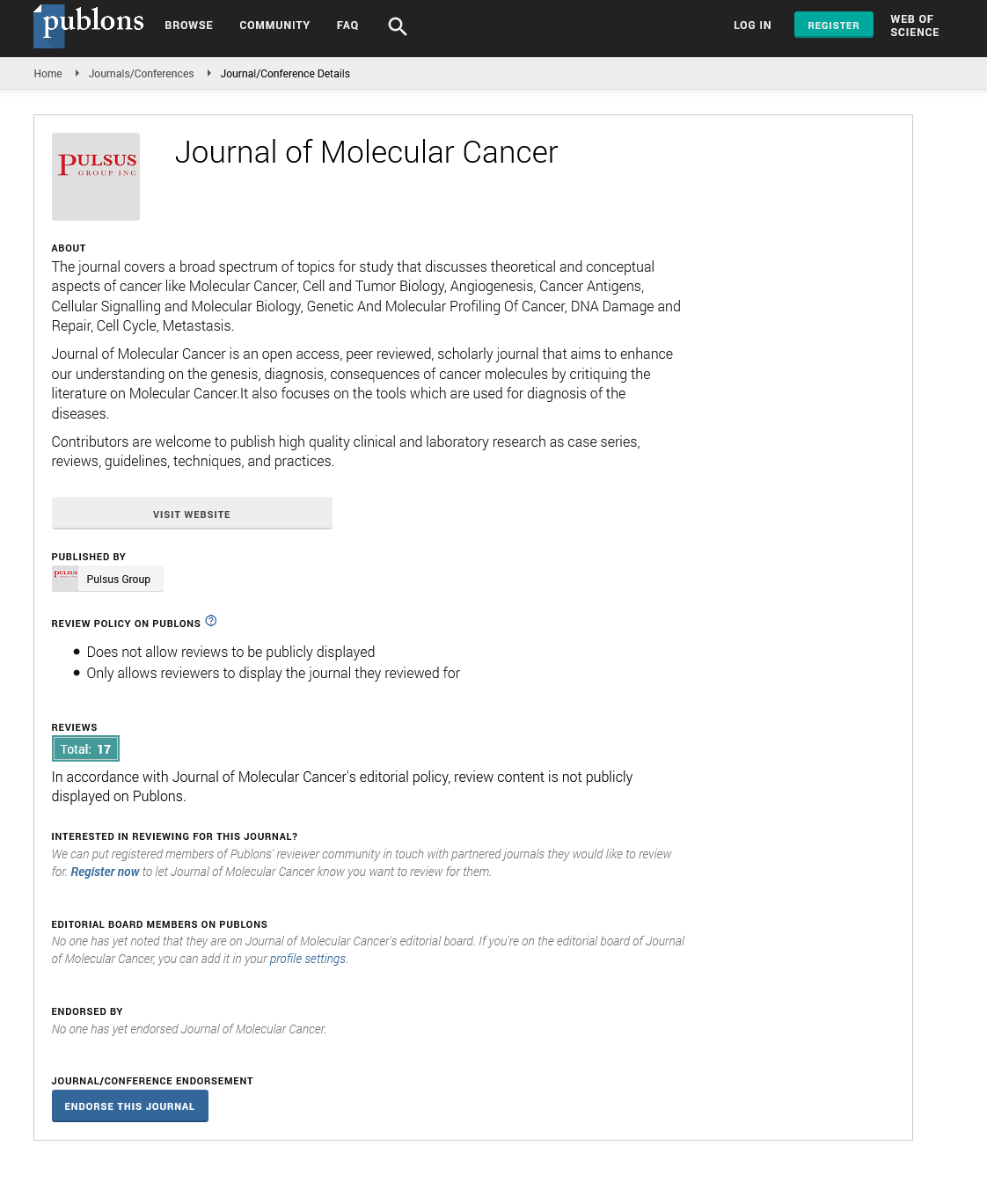Unveiling cancer: Mechanisms, progress and future directions
Received: 22-Mar-2024, Manuscript No. puljmc-24-7145; Editor assigned: 23-Mar-2024, Pre QC No. puljmc-24-7145; Accepted Date: Apr 27, 2024; Reviewed: 12-Apr-2024 QC No. puljmc-24-7145; Revised: 19-Apr-2024, Manuscript No. puljmc-24-7145; Published: 29-Apr-2024
Citation: Akouibaa A. Unveiling cancer: Mechanisms, progress and future directions. J Mol Cancer. 2024; 6(2):1-2.
This open-access article is distributed under the terms of the Creative Commons Attribution Non-Commercial License (CC BY-NC) (http://creativecommons.org/licenses/by-nc/4.0/), which permits reuse, distribution and reproduction of the article, provided that the original work is properly cited and the reuse is restricted to noncommercial purposes. For commercial reuse, contact reprints@pulsus.com
Abstract
Cancer remains one of the most significant global health challenges, characterized by uncontrolled cell growth and the potential for metastasis. This article provides a comprehensive overview of cancer, exploring its underlying mechanisms, current advancements in research, and emerging therapeutic strategies. We will delve into the genetic, environmental, and lifestyle factors that contribute to cancer development, discuss the major types of cancer, and review the latest in diagnostic and treatment technologies. By highlighting ongoing research and future directions, this article aims to offer insights into how we can advance cancer prevention, detection, and treatment.
Key Words
Cancer; Tumorigenesis; Metastasis; Genetic mutations; Diagnostic technologies, Targeted therapy; Immunotherapy; Precision medicine
Introduction
Cancer, a complex and heterogeneous group of diseases, poses a formidable challenge to modern medicine. Characterized by uncontrolled cell proliferation, cancer can arise in virtually any tissue or organ of the body. It is the second leading cause of death globally, with millions of new cases and deaths reported annually. The complexity of cancer is reflected in its multifactorial etiology, which includes genetic mutations, environmental exposures, and lifestyle factors.
Understanding cancer requires a multifaceted approach, integrating knowledge from molecular biology, genetics, epidemiology, and clinical research. This article aims to provide a comprehensive overview of cancer, focusing on its mechanisms, current advancements in research, and emerging therapeutic strategies. By examining these aspects, we can gain a deeper understanding of cancer's nature and explore innovative approaches to improve prevention, diagnosis, and treatment.
Cancer development is a multistep process involving various genetic and environmental factors. The progression from normal cells to cancerous cells is characterized by several key mechanisms:
Genetic mutations are central to cancer development. These alterations in the DNA sequence can be inherited or acquired. Oncogenes, tumor suppressor genes, and DNA repair genes are crucial in this context:
Genes that, when mutated or overexpressed, promote cancer cell growth. For example, mutations in the Ras gene lead to continuous cell signaling that drives tumor proliferation.
Genes that normally inhibit cell growth and division. Mutations or deletions in genes like TP53, which encodes the p53 protein, can result in loss of growth control and contribute to cancer progression.
Genes involved in repairing damaged DNA. Deficiencies in these genes, such as those found in hereditary breast and ovarian cancer syndrome (BRCA1/BRCA2), increase the risk of cancer.
Epigenetic modifications, such as DNA methylation and histone modification, can alter gene expression without changing the DNA sequence. These changes can lead to the activation of oncogenes or silencing of tumor suppressor genes. For instance, hypermethylation of promoter regions can silence genes that normally prevent cancer, contributing to tumorigenesis.
The tumor microenvironment plays a crucial role in cancer development and progression. Tumors are not just composed of cancer cells but also include surrounding stromal cells, blood vessels, and extracellular matrix components. Interactions between tumor cells and the microenvironment can influence tumor growth, invasion, and metastasis.
Metastasis involves the spread of cancer cells from the primary tumor to distant sites, which is a major factor in cancer morbidity and mortality. This process includes local invasion, intravasation into the bloodstream or lymphatic system, dissemination, and extravasation into distant tissues. Understanding these steps is essential for developing strategies to prevent or treat metastatic cancer.
Recent advancements in cancer research have significantly enhanced our understanding of the disease and improved therapeutic options. Key areas of progress include:
Precision medicine involves tailoring treatment based on the individual characteristics of each patient, including genetic and molecular profiles of their tumors. By identifying specific mutations or alterations in a patient's cancer, clinicians can select targeted therapies that are more likely to be effective. This approach has revolutionized treatment for various cancers, including melanoma and Non-Small Cell Lung Cancer (NSCLC).
High-throughput genomic sequencing technologies, such as NextGeneration Sequencing (NGS), have enabled comprehensive analysis of cancer genomes. These technologies allow researchers to identify genetic mutations, copy number alterations, and other genomic changes associated with cancer.
Immunotherapy harnesses the body’s immune system to recognize and destroy cancer cells. Recent breakthroughs include immune checkpoint inhibitors, which block proteins that inhibit immune responses, and CAR-T cell therapy, which involves engineering a patient’s T cells to target cancer cells.
Conclusion
Cancer is a complex and multifaceted disease characterized by uncontrolled cell growth and the potential for metastasis. The mechanisms underlying cancer development include genetic mutations, epigenetic changes, and interactions with the tumor microenvironment. Recent advancements in cancer research have significantly improved our understanding of the disease and have led to the development of innovative therapeutic strategies, including precision medicine, immunotherapy, and targeted therapies.
As research continues to advance, the goal is to further refine and personalize cancer treatment, improve early detection, and enhance patient outcomes. Emerging technologies such as genomic sequencing, liquid biopsies, and gene editing hold promise for revolutionizing cancer care. By continuing to explore and integrate these advancements, we can make strides toward more effective and less toxic treatments, ultimately bringing us closer to a future where cancer is better managed and potentially curable.
The fight against cancer is ongoing, but with each advancement, we move closer to understanding and overcoming this formidable disease. Continued investment in research and collaboration across disciplines will be essential in achieving these goals and improving the lives of millions affected by cancer worldwide.






